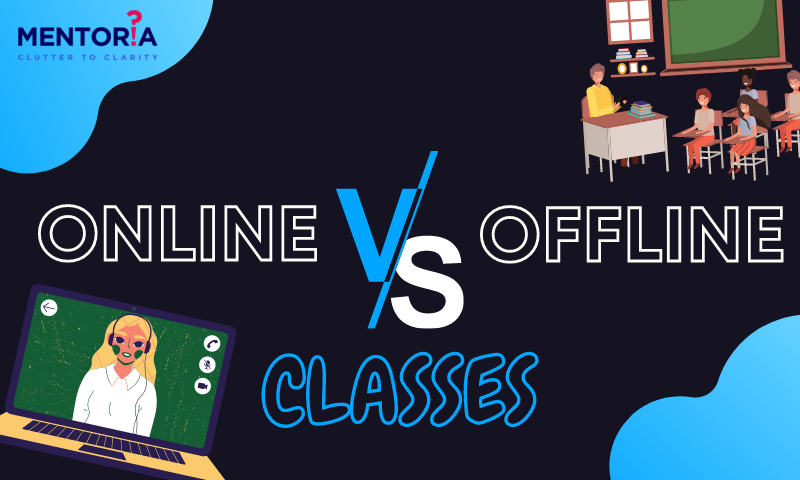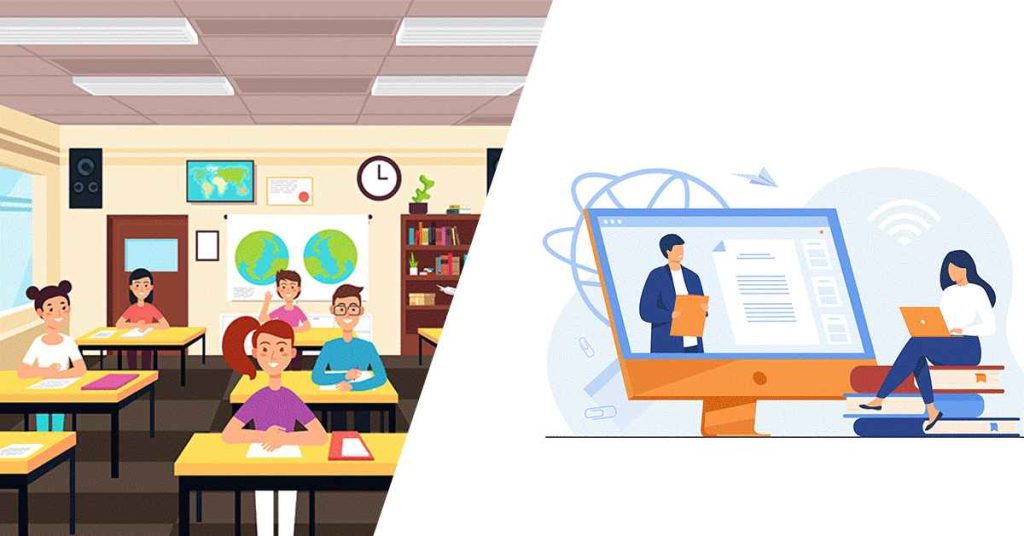Online v/s Offline: Let’s Settle the Debate!


The pandemic has wreaked confusion and chaos in our everyday lives. From work to attending school or college classes, everything has switched online. It has been nothing but challenging to acclimatise to the sudden changes brought on by the pandemic. Unfortunately, the future of our nation – the students – are among the most affected groups. They are befuddled, tired and unmotivated as a result of the pandemic. However, over time, they had to come to terms with the online form of schooling. And now that they’ve gotten used to online classes, schools opened up and began offline classes again. Many students and parents have conflicted opinions about the modes of teaching. Some might prefer attending classes or lectures online from the comfort of their homes, while others prefer the offline mode of learning. Both online and offline learning have pros and cons, but which is better, online or offline classes? Let’s dive in and find out!
What are online classes?
With the advent of technology, the process of delivering education has forever changed. The online mode of teaching has become a flexible instructional process of teaching wherein children and students can easily and effortlessly access study material in the comfort of their homes. Moreover, online classes also provide an excellent opportunity for children who cannot enrol in formal or traditional classrooms and support them in setting and figuring out their own pace for studying.
Online education also helps develop the practice of self-discipline and time management within students and gives them access to unlimited academic resources. From the comfort of their house, students can easily set their own pace of learning and growing. All they need is a laptop and a good internet connection.
What are offline classes?
Offline classes or education is the formal or classic counterpart to online classes.It’s a traditional method of learning that lets students have daily face-to-face interactions with their professors and teachers. As much as online classes are deemed to be the future of learning, they simply cannot replace the holistic aspect of offline classes or education. The offline mode of classes or teaching is and will not be severely affected by technical issues. More importantly, it allows for a collaborative learning atmosphere, and gives students an opportunity to develop their social skills.
Moreover, the offline mode of education also lets professors and teachers observe their students’ responses and behaviour and accordingly address or help them out when required. No matter how advanced online classes are, offline education will continue to play a crucial role in the development of the students.
Need a clearer idea of which is better, online or offline classes? Let’s check out the pros and cons of both!
Pros of online classes
- Convenience
Online education’s first and most obvious advantage is that it’s much more convenient. You can attend online classes from the comfort of your own home or view recordings of any lectures you may have missed out on. All you need is a stable internet connection and a laptop or smartphone to get started. - Efficiency: Not only have you saved yourself a lot of time by not having to travel to attend a class, but you now also have more freedom in choosing the perfect time to study with online classes. Online classes let you pursue your academic and personal goals on your own time at your own pace.
- Promotes self-discipline: Online classes require self-discipline. You don’t have a professor or a teacher to tell you when a pending assignment is due on Friday. Your friends won’t remind you about the project you must submit on Tuesday. You have to log in and take part in the discussions to get participation credit. If you miss out, you will fall behind quickly. By attending online classes, you will develop stronger self-discipline, which will reflect on other areas of your life as well, such as work ethic and even relationships.
Cons of online classes:
There are two sides to every coin. With all the pros online classes have to offer, there are a few disadvantages that come along as well.
- Isolated learning: Everyone’s unique and learns in their own way. Some students can learn and work alone, while some feel comfortable in their school or college community. Here, they have easy access to professors, teachers or fellow classmates. For those who work well in a community structure, attending classes in isolation might make them feel trapped.
- Technical challenges: Nothing ruins an online lecture more than audio, video or connectivity issues. It’s even more challenging for students from rural parts of the country. Unlike metropolitan cities, they often don’t get to enjoy fast and good networks, which is sadly a must for online classes.
- Onus on learner: Online classes require self-discipline to set aside time to finish your studies. If you’re not very good at self-discipline, this can be a hard way to learn.
Pros of Offline Classes:
We agree that online classes can be attended from the comfort of your house, but the real question is: Are online courses as practical as offline classes? So let us explore what the pros of attending offline classes are.
- Practice-based education: First and foremost offline mode of education has well-equipped laboratories, a gymnasium, and practice rooms. This is of utmost need for those students who have opted for classes that require practice or experimentation, such as physics, chemistry, biology or even geography! Suppose you are not opting for offline education. In that case, your learning is getting limited to the theory, and you will never be able to completely grasp the basic concepts if you are unable to know their practical essence.
- Social interaction: One major advantage of offline classes is that they promote better teacher-student interaction and extend learning beyond traditional lectures. If there are exciting, engaging sessions, the students’ attention span also rises!
- Extracurricular activities: We all know how crucial extracurricular activities are! And only offline forms of education can effectively cater to them. It’s true that extracurricular activities hugely impact academic success! At the same time, it helps students improve their social skills by making classmates work and play together as a team.
- Healthy student competition: As we have seen, offline classrooms enhance and promise better student engagement. When such a dynamic atmosphere is created, students tend to interact with one another, which leads to better and higher learning.
Cons of Offline classes
- Extra travelling costs: Universities and colleges have their institutes at one location, and each student must get to their destination. Unless you stay in the campus or close by, you’ll spend a lot of time and money travelling to and from school or college.
- Fixed schedule: Unlike online classes, there is no room for flexibility with offline classes because the times are set. If you miss a class, you have to rely on other students’ notes to catchup. If you’re in college and also working alongside, it might become difficult to balance both work and studying. Research findings show that students’ attendance differs in online (72%) and offline classes (62%).
- Limited choice of courses: If you’ve enrolled for a particular course with a particular college, you’re limited to the subjects they offer. Online classes allow you to access classes with teachers across the globe, but offline classes limit you to teachers and courses offered by the school or college you’re studying at.
- Hard time for introverted students: One of the significant drawbacks of offline classes is that it becomes tricky for introverted kids to adapt to such a happening background at a go. Resulting in making them feel stressed, anxious and overwhelmed.

So when it finally comes to online classes vs offline classes, which one is better? The answer depends entirely on which one suits you best! Both educational mediums are best in their own way for specific situations and student requirements.
Once you’ve resolved the debate between offline and online learning, you will find yourself facing another challenge – what to do after college! If you need guidance in figuring out your next steps, our team of experts can help with that! Sign up and begin the Mentoria Assessment to discover yourself and your ideal future path today.






